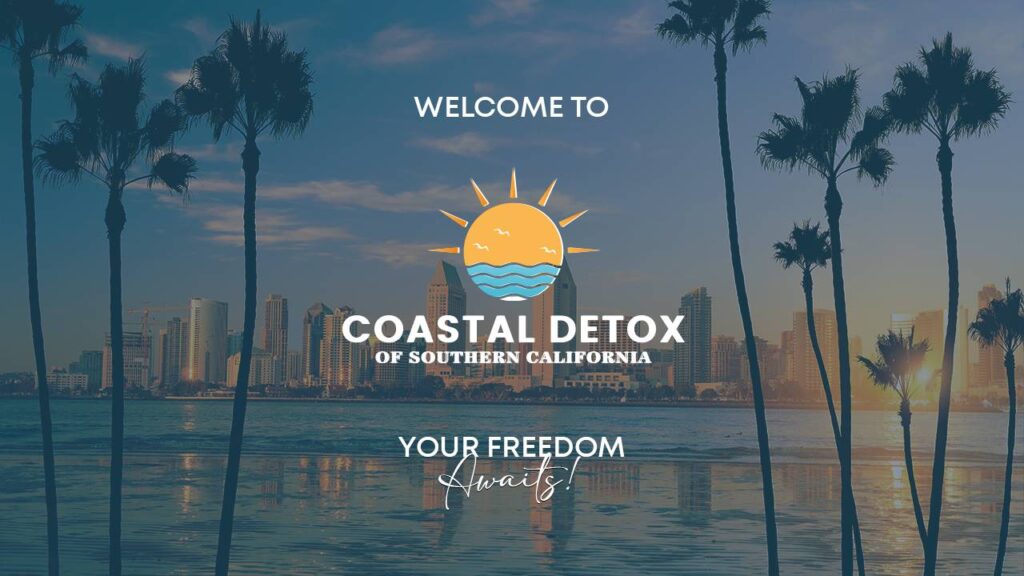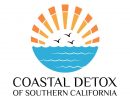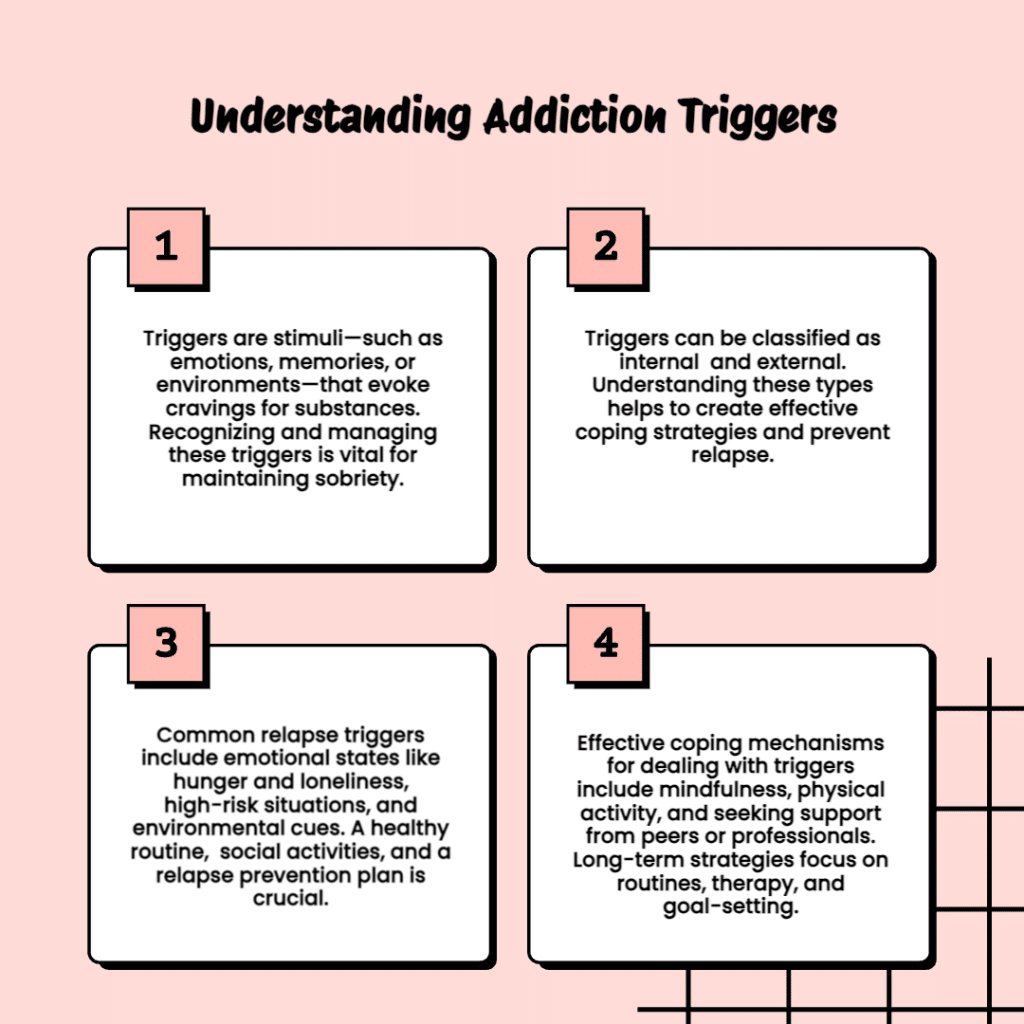Recovery from addiction is a transformative journey, but it comes with challenges—one of the biggest being triggers in recovery. Triggers can stir up memories, emotions, or cravings that put sobriety at risk, making relapse prevention a crucial part of maintaining long-term recovery.
Understanding addiction triggers, learning how to manage them, and building a strong relapse prevention plan can help individuals in addiction recovery stay committed to their goals.
This guide explores internal and external triggers, common relapse triggers, and coping strategies to help individuals navigate their recovery process with confidence.
What Are Triggers in Recovery?
A trigger is anything—an emotion, situation, person, place, or memory—that sparks a craving or urge to use substances. While triggers don’t always lead to relapse, they increase vulnerability and must be managed effectively.
Triggers can be divided into two categories:
- Internal triggers – Emotional and psychological states that lead to cravings.
- External triggers – Environmental and situational factors that create an urge to use substances.
Recognizing both internal and external triggers is essential for managing triggers effectively and preventing a return to substance abuse.
Types of Triggers: Internal vs. External
Internal Triggers (Emotional & Psychological)
Internal triggers are thoughts, feelings, and emotions that make a person want to engage in drug use or alcohol addiction. These triggers include:
- Stress, Anxiety, or Depression – Common in those with mental health disorders.
- Loneliness or Isolation – A major challenge for a recovering addict.
- Negative Self-Talk or Low Self-Esteem – Can lead to a downward spiral in the recovery journey.
- Overconfidence in Recovery – Believing you can control substance use disorder.
- Boredom or Restlessness – A lack of healthy stimulation may lead to relapse triggers.
- Unresolved Trauma or PTSD Flashbacks – Often require professional treatment, such as group therapy or an intensive outpatient program.
External Triggers (Environmental & Situational)
External triggers stem from environmental and social factors that remind individuals of past substance abuse. These may include:
- Being Around People Who Use Drugs or Alcohol – Peer pressure or old friends.
- Visiting Old Hangouts – Bars, clubs, or places linked to addiction relapse.
- Attending Celebrations & Holidays – These often involve alcohol or common relapse triggers.
- Stressful Life Events – Job loss, relationship conflicts, or financial problems.
- Exposure to Drug Paraphernalia or Advertisements – Seeing substances can be a relapse trigger.
While internal triggers require emotional relapse awareness, external triggers can often be avoided with strategic relapse prevention planning.
Common Triggers in Addiction Recovery & How to Handle Them
1. H.A.L.T. (Hungry, Angry, Lonely, Tired)
Basic physical and emotional needs, when unmet, can make managing triggers harder.
Solution: Maintain a healthy diet, get enough sleep, engage in stress management, and build a support system.
2. Stress & Anxiety
Chronic stress is one of the most common relapse triggers, making substance abuse treatment necessary for some individuals.
Solution: Try mindfulness, deep breathing, and physical exercise to manage stress.
3. Social Isolation
Feeling alone increases the risk of mental relapse and returning to drug use.
Solution: Stay engaged with group therapy, support groups, and healthy social activities.
4. Romantic Relationships
Emotional highs and lows in relationships can create emotional triggers.
Solution: Experts recommend waiting at least a year before starting a new relationship in early recovery.
5. Nostalgia for Past Use
Glamorizing past substance use can make relapse feel justifiable.
Solution: Challenge distorted memories and focus on why you chose recovery.
6. High-Risk Locations or Situations
Returning to places associated with substance use disorder can bring back strong cravings.
Solution: Avoid these places when possible and create an exit plan for risky situations.
7. Celebratory Events & Holidays
Even positive events can be relapse triggers, as people may want to “celebrate” with substances.
Solution: Plan sober-friendly events and bring supportive friends when needed.
How to Identify and Manage Your Triggers
1. Self-Reflection & Awareness
- Keep a trigger journal to track emotional and situational triggers.
- Work with a therapist to uncover hidden addiction relapse triggers.
2. Develop a Relapse Prevention Plan
- Identify high-risk situations and create coping strategies in advance.
- Have an accountability partner or sponsor for support.
3. Healthy Coping Strategies for Triggers
- Mindfulness & Meditation – Helps regulate emotional triggers.
- Exercise & Physical Activity – Reduces stress and improves mental health.
- Talking to Someone – Reach out to a sponsor, friend, or therapist.
- Engage in Positive Distractions – Hobbies, reading, or outdoor activities.
What to Do If You Experience a Trigger
- Acknowledge the trigger without judgment.
- Use grounding techniques like deep breathing or the 5-4-3-2-1 method.
- Remove yourself from the situation.
- Call a sponsor or trusted friend.
- Remind yourself of the consequences of relapse and your progress.
Recognizing the Stages of Relapse
Relapse is a gradual process that can be prevented if warning signs are recognized early.
1. Emotional Relapse (Early Warning Signs)
- Bottling up emotions
- Skipping therapy or support meetings
- Neglecting self-care (sleep, nutrition, and stress management)
2. Mental Relapse (Internal Struggle)
- Cravings and glamorizing past substance use
- Thinking about controlled use (“just one won’t hurt”)
- Looking for opportunities to relapse
3. Physical Relapse (Using Again)
- Returning to substance use
- Increased difficulty stopping after “just one”
- **May require additional substance abuse treatment or alcohol detox
Long-Term Strategies for Preventing Triggers
- Create a Structured Routine – Predictability fosters stability in recovery.
- Stay Connected to a Sober Community – Support is key for relapse prevention.
- Continue Therapy or Support Groups – Professional guidance reinforces coping strategies.
- Prioritize Self-Care & Healthy Living – Mental and physical well-being go hand in hand.
- Set Goals & Celebrate Sobriety Milestones – Boosts confidence and reinforces progress.
Embracing Recovery Despite Triggers
Triggers in recovery are inevitable, but they don’t have to define your recovery journey. With self-awareness, coping mechanisms, and a strong support system, you can navigate potential triggers and stay on track.
Recovery is a lifelong process. If you experience a relapse trigger, lean on your relapse prevention plan, reach out for support, and remind yourself why you started this journey.
If you or a loved one needs support in managing triggers and maintaining sobriety, reach out to Coastal Detox of Southern California today. Help is available, and you are not alone.









